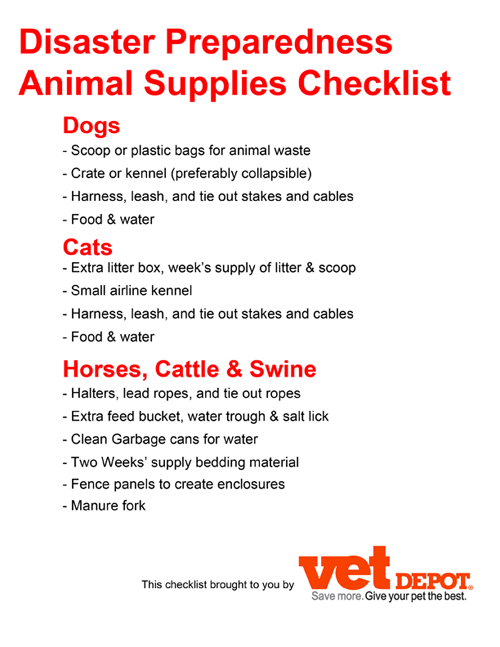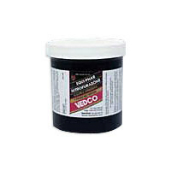Stock up on all the things you'd need to take care of your horse if a disaster strikes. If you leave things up to chance, you may be unprepared during an emergency. The following is a helpful shopping list to help you put together a disaster preparedness kit for your horse.
Adjust the amounts of supplies based on the number of animals you have.(For a PDF version of the checklist click here)

Food
Horses have delicate digestive systems, so it's best to keep your animal on the same diet during a disaster that they're accustomed to.
As part of your emergency supplies, you should keep a reserve of your horse's regular feed--enough to last at least one week. Store the feed in an airtight, waterproof container. Be sure to rotate the feed every three months. It's also recommended to keep an extra feeding bucket with your supplies in case the one you normally use gets lost.
Water
It can be a challenge to water horse during a disaster if the water supply has been disrupted or contaminated. Dehydration can be dangerous for horses, so having enough water to last each of your animals at least a week is recommended. 50-gallon barrels are good for storing your horse's water supply.
Keep the water in a cool, dark place, and be sure to rotate it so it remains fresh. Like with the food, include an extra water bucket in case the one you normally lose gets lost.
Sanitation
Keeping your horse's environment clean during a disaster may help minimize the treat of disease. Have a week's worth of shavings on hand, a pitchfork, and if possible, an extra wheelbarrow or muck bucket.
Identification
Some forms could include: microchipping, tattoos, or freeze branding. But if your horse isn't permanently identified, there are other options for temporary identification:
- Write your contact info on the horse with a livestock crayon
- Shave your contact info into your horse's coat with clippers
- Braid an ID tag with your contact info into your horse's mane
- Keep current photos of your horse (including some with you in them with the animal) so you can prove ownership
- Include a copy of the Bill of Sale for your horse with your disaster supplies to prove ownership
First Aid Kit

VetDepot carries a large variety of wound care products and topical antibiotics, and you should talk to your veterinarian about what items you should include in a horse first aid kit. Some of them may include:
Horse Medications
If your horse is on any long-term pet medications, try to keep at least a two week supply on hand. Check with your veterinarian or mobile veterinarian to see if they have a disaster plan in place. Find out what veterinary professionals are in your area that could provide medical care if your horse gets injured during a disaster or during an evacuation.
Having copies of your horse's medical records, including their Croggins certificate, with your disaster kit supplies is a good idea.
Temporary Housing
With large animals like horses, it's important to make arrangements ahead of time so you'll have to place to house them if you have to evacuate during a disaster. You may need to tie them out, so you should have the appropriate lead rope and halter with your supplies. (You may need to train your horse to tether so you aren't attempting this for the first time during a disaster).
Some examples of temporary housing include: equine centers, stables, fairgrounds, or racetracks. If there are a lot of horse-owners around where you live, team up and create a community evacuation plan.
Practice loading and unloading your horse ahead of time. An evacuation is not the best time to try and convince a horse to go inside a trailer for the first time.
The above is provided for information purposes only and should not be used for the diagnosis or treatment of any condition.
This information does not cover all possible variables, conditions, reactions, or risks relating to any topic, medication, or product and should not
be considered complete. Certain products or medications may have risks and you should always consult your local veterinarian concerning the treatment of
your pet. Any trademarks are the property of their respective owners.